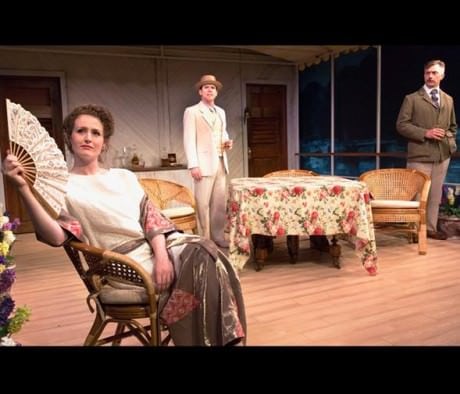The Mint Theater, in a 100 seat space on the 3rd floor of an office building on West 43rd Street, has been fulfilling its mission of re-discovering forgotten gems from the past, and offering them at reasonable prices to theatre lovers who have been loyal. The current offering could be the poster boy for the entire enterprise, for who of us can possibly remember this gem of a comedy from a writer who died in 1915 at the age of 29? The New Morality offers us a look into the high society of 1911 and does it with wit, intelligence, and the keenest ear for literate comedy dialogue since Bernard Shaw and Oscar Wilde. I’d never heard his name, Harold Chapin, yet he preceded Noël Coward, Philip Barry, S.N. Behrman, John Van Druten and others far more famous than he for capturing the goings on of the international set as they fumed and fussed just before and after World War I.

The New Morality concerns itself with the scandal that can erupt when one lady of fashion learns that her husband has been fooling around with the wife of one of their best friends. At curtain’s rise on Act I, we meet Betty Jones (well played by Brenda Meaney) as she regales her friend Alice Meynell with how. after fuming for weeks, she’d confronted her neighbor Muriel Wister, the woman who’d been making eyes at her husband, and she had used bad language, which just wasn’t done in British society in 1911. The two couples live on houseboats, moored in the Thames, which makes them distinctive for starters. Muriel’s husband E. Wallace, pops across the river to demand an apology from Betty, and she absolutely refuses to offer one, which escalates this tiff into a big time war until playwright Chapin finds a solution that all can live with. If this seems to be a tempest in a teacup, it only proves that even trivia can be entertaining, suspenseful, and even relevant if the characterizations are rounded and recognizable. And in this merry romp, they certainly are.
Ms. Meaney’s attack on Betty Jones is crisp and effective. She’s a beautiful woman who can wrap her tongue around crystal words that are sharper than a serpent’s tooth. My one complaint about this performance is that she tends to rush along consistently, losing some of the laughs the words deserve.
Ned Noyes as Mr. Wister, shows us just how those bon mots should be slung, taking a breath now and then just before delivering the killer ending to one of his speeches. His is truly a brilliant high comic performance. Last season he brought the same talents to a very small role in Broadway’s You Can’t Take It With You, and small or not, I remember him well.
As Betty’s husband Ivor, Michael Frederic is just pompous enough to land as someone who might well cause a wife to become frustrated and a bit nasty. Clemmie Evans brings a fresh persona to the very proper Alice Meynell who seems to be getting a vicarious kick out of all the shenanigans, registering all the proper reactions, but somehow letting us know she wouldn’t have missed a moment.
Christian Campbell as Betty’s brother, a Kings Counsel, is on the right track, looks comfortable in the role, but has not quite mastered the twists and turns of the dialogue, so much of what he has to say goes off and upstage. Once he works on that, he’ll be fine.
Douglas Rees and Kelly McReady complete the cast as the obligatory maid and butler. One or the other, and often both, are required for this sort of pastry, and I will never forget Thornton Wilder’s ending their reign in high comedy by allowing the brilliant Tallulah Bankhead, as the maid in The Skin of Our Teeth, to start the play with a very long speech of pure exposition that includes: “It’s six o’clock and the Master not home yet. It’s so cold the dogs are sticking to the sidewalks.”

I give special kudos to Director Jonathan Bank, for this play has had a troubled past. Its author never saw it performed, as he died on the battle field in 1915. It was called his finest comedic achievement, but it remained unproduced until 1920. It was only done for two performances, it showed up in New York in 1921 where it was found “piquant and pleasing” but it only played a handful of matinees. It had some success in London in 1925 but it’s never received its proper due, until now. It’s not a major play, but it certainly exemplifies a style of writing once fashionable, now long gone.
The New Morality is crafty, well constructed, and a fine example of a period in theatre when words mattered and actors were trained to deliver them on a silver platter.
Running Time: Almost two hours, with no intermission.
The New Morality plays through October 18, 2015 at The Mint Theater Company – 311 West 43rd Street, 3rd Floor, in New York City. For tickets, go to the box office, call (866) 811-4111, or purchase them online.




